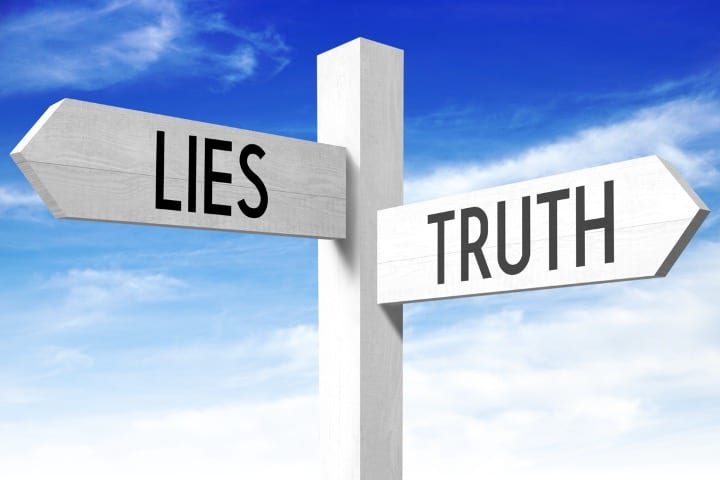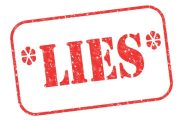
Years ago at a recreational facility, I saw a man wearing a shirt stating, “Everybody lies. Nobody cares.” He didn’t seem like an aspiring politician (or any kind of lawyer!), but could a message about everyone stealing and no one caring be next? There is a connection there, too:
Liars rob their fellow man of the knowledge of Truth — that priceless resource that “will set you free.”
One man who may agree is Mark Corallo, former director of public affairs at the U.S. Department of Justice. Writing recently at RealClearPolitics, Corallo states how he was told early in his career that while “spin” was expected, “lying to reporters was the unforgivable sin.” (Note here that “spin” has a negative connotation because it often refers to propaganda; in such a case, it is a biased interpretation of events that, at best, reflects intellectual dishonesty — aka “lying to oneself.” And the normalization of this kind of deception paves the way for more brazen lies’ acceptance.)
Corallo then relates a story about how on February 6, 2004, he told reporters that no investigation had been opened into the leak of CIA agent Valerie Plame’s identity, only to later learn that one had been quietly initiated that very evening. Livid upon hearing about the investigation, the reporters cursed him out and called him a “bleeping liar”; their anger only subsided when the government lawyer who opened the investigation vouched for Corallo and revealed that the latter hadn’t yet been given the news when he made his media statement.
Now, Corallo’s understanding was that if you outright lied to a reporter, he’d not only no longer trust you but would also ensure his colleagues wouldn’t use you as a source. He also stated that he has always recognized the need for an adversarial press, and had even filed amicus briefs defending journalists’ right to protect their sources. Yet he’s now disheartened. As Corallo writes:
A lot about journalism has changed in 20 years, and perhaps I was naïve, but what should not have changed is the fundamental principle that reporters should expect sources to tell the truth and should impose severe penalties when sources violate that principle. And yet here we are.
How else can the press explain their ongoing relationships and use of intelligence officials as named sources in their reporting who flat out lied about Hunter Biden’s laptop bearing the “classic hallmarks” of a Russian disinformation campaign? Former CIA Director Michael Morel lied. Former CIA Director James Brennan lied. Former Director of National Intelligence James Clapper lied.
These liars lied to the press to prop up the political campaign of Joe Biden. These former intelligence chiefs lied to the press fully expecting reporters would lie to the American people. Yet these liars still hold lucrative gigs on the cable networks as expert commentators, are regularly used as on-the-record, and no doubt off-the-record, sources to the entire cadre of Beltway journalists. These liars will frequent the White House Correspondents Dinner and all the exclusive cocktail parties this weekend hosted by news organizations.
Perhaps Corallo was naïve — and perhaps still is. After all, he makes no mention of the most obvious interpretation of his unfortunate Plame event: He was part of the Republican George W. Bush administration!
As today, the media were then (and well before) heavily biased against the GOP. Essentially the Democrats’ public relations team, they were, for example, quite tolerant of the lies of perhaps the presidency’s greatest prevaricator: Bush’s predecessor, Bill Clinton. What’s more, Clinton hack George Stephanopoulos was enthusiastically welcomed into the media (ABC).
Corallo does mention that media lying goes way back, citing how New York Times Moscow correspondent Walter Duranty covered up Soviet leader Joseph Stalin’s 1930s mass murder. In fact, there’s something tragically comical about mainstream media reporters being oh-so offended by lies; it’s a bit like Bill Clinton taking umbrage at unchaste behavior.
Yet insofar as such reporters are genuinely upset at being deceived (and some are), it gets at a truth: The Golden Rule, “Do unto others…,” is an excellent behavior guide precisely because things objectively wrong are universally wrong — and people will universally (or almost) not want them done unto them. Some people steal, but even they don’t want to be stolen from. Abusers will abuse, but don’t want to be abused. People universally don’t want to be lied to because lying really is objectively wrong.
It’s damaging, too. For as with a computer — garbage in, garbage out — misinformation fed to people increases the likelihood they’ll make mistakes in choosing policies and politicians. It’s garbage in, demagogue out.
Thus is what Corallo actually perceives so tragic. The media have long been dishonest, but this problem worsens as virtue in America withers. Soviet representatives would decades ago appear on our TV and tell lies so brazen that we’d laugh at their ridiculousness. When President Gerald Ford said, foolishly, in a 1976 debate that there “is no Soviet domination of Eastern Europe,” many believed it doomed his campaign. Yet White House press secretary Karine Jean-Pierre can now claim illegal migration is down 90 percent under Biden, and mainstream media don’t seem too troubled.
So why is America increasingly a post-Truth society? An analogy: Junk food manufacturers will sell their fare by claiming it’s delicious. Claiming it’s healthful, however, would be a lie contrary enough to nutritional laws to be disqualifying. If, however, a good part of society fell victim to “dietary relativism” and essentially believed those laws didn’t exist, taste would then be the best guide for what to ingest. And with many people either not believing in nutritional truth or not caring about it, junk food could perhaps be billed as healthful. Everyone would have his own “truth,” after all, and, hey, if it tastes good, eat it.
Likewise, as moral relativism/nihilism waxes and recognition of and love for Truth wanes, more and more people make their agenda “truth.” It is then that the definition of a “lie” can change — to “that which contradicts the (deified) agenda.” Ergo the labeling of lies as “information” and Truth as “misinformation.”
No one can be a truly great journalist (or voter) without loving Truth — and today’s media love anything but.



